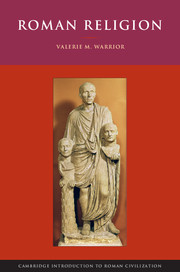Book contents
- Frontmatter
- Contents
- List of Illustrations and Maps
- Preface
- Acknowledgments
- 1 The Gods and their Worship
- 2 Divination, Prayer, and Sacrifice
- 3 Religion and the Family
- 4 Religion and the State
- 5 Religion and War
- 6 The Calendar, Festivals, and Games
- 7 Official Attitudes toward Foreign Cults
- 8 Magic and the Occult
- 9 Becoming a God
- 10 The Jews and Christianity
- Chronology
- Maps
- Gods
- Glossary
- Ancient Sources
- Bibliography
- Illustration Credits
- Index
10 - The Jews and Christianity
Published online by Cambridge University Press: 05 February 2015
- Frontmatter
- Contents
- List of Illustrations and Maps
- Preface
- Acknowledgments
- 1 The Gods and their Worship
- 2 Divination, Prayer, and Sacrifice
- 3 Religion and the Family
- 4 Religion and the State
- 5 Religion and War
- 6 The Calendar, Festivals, and Games
- 7 Official Attitudes toward Foreign Cults
- 8 Magic and the Occult
- 9 Becoming a God
- 10 The Jews and Christianity
- Chronology
- Maps
- Gods
- Glossary
- Ancient Sources
- Bibliography
- Illustration Credits
- Index
Summary
With the mind alone, the Jews conceive of only one god. They regard as impious those who fashion from perishable materials images of gods in the likeness of men. The supreme and eternal being is for them inimitable and eternal. Therefore they set up no statues in their cities, let alone in their temples. No flattery is paid to their kings, no honor to the Caesars [emperors].
(Tacitus, Histories 5.5)We have seen how the state attempted to control the infiltration and adoption of foreign cults. A monotheistic religion, however, could not be reconciled with traditional Roman religious practice, as the above excerpt from Tacitus implies. The first extant reference to the presence of Jews in Rome is to their expulsion from the city in 139 BCE because they were trying to pass on their sacred rites to the Romans (Valerius Maximus, Memorable Deeds and Words 1.3.3). The numbers involved, however, were probably quite small, whether permanent residents or transients.
The sources for the next several decades are scanty, but by the late republic there was a substantial Jewish community permanently resident in Rome. Most of these people had been brought to Italy as captives, probably after Pompey's conquest of Syria in the 60s BCE. Many had been freed and later became Roman citizens (Philo, Embassy to Gaius 155). The Roman authorities were consequently faced with the permanent presence of people whose ancestral customs and conventions were very different from their own.
- Type
- Chapter
- Information
- Roman Religion , pp. 119 - 130Publisher: Cambridge University PressPrint publication year: 2006



